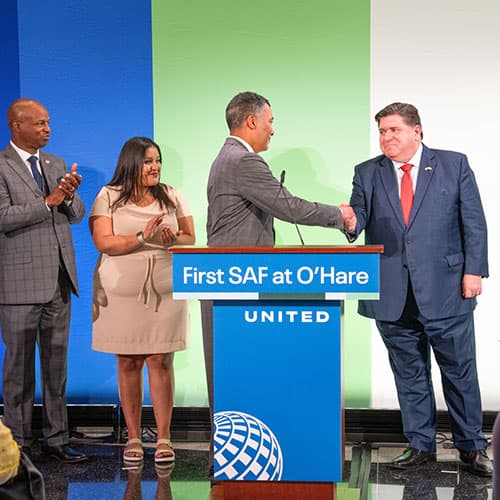
Accelerating the SAF marketplace through policy

United has a long-standing history of actively shaping the direction around the energy transition in our industry by leading various collaborations to create demand and market signals incentivizing production of low-carbon fuel and technology.
Global SAF production reached approximately 340M gallons in 2024, about enough to fuel the global aviation industry for one day a year.
SAF today is in limited supply. The International Air Transport Association (IATA) estimates that in 2024, approximately 340 million gallons of SAF were produced globallyFootnote 1, while forecasts estimate the entire aviation industry used nearly 100 billion gallons of conventional jet fuel.Footnote 2 This means the entire global supply of SAF represents 0.3% of the world’s fuel usage.
United recognizes that SAF volumes available in the market today are insufficient for the decarbonization of air travel, underscoring the need for collaboration across private and public sectors, including policymakers, cross-industry partners, low-carbon fuel producers/suppliers, employees and customers. United is participating in multiple efforts to address current challenges, including investing in technology that could help scale the SAF market, exploring potential SAF production sources for near-term supply and advocating for policies that encourage the use of SAF.
“This is what happens when innovation, leadership and policy come together. While the market for SAF is still in its infancy, there is a huge opportunity today for airlines and policymakers to work together to support its continued growth—SAF at O’Hare was made possible thanks to Governor Pritzker and the Illinois Legislature passing tax incentives.”

Brett HartPresident – United
- Federal SAF Incentives: We worked with federal policymakers to support the passage of the first-ever SAF specific tax credit (the SAF Blender’s Tax Credit), and for special treatment of SAF in the new Clean Fuel Production Credit. These tax credits help to incentivize U.S. fuel producers to invest in and produce SAF. While United is not a recipient of these tax credits, we believe that establishing positive and fair incentives will be critical to scaling and commercializing SAF, while securing U.S. leadership in this burgeoning industry. We continue to engage in a leadership capacity with the SAF Coalition, representing 55 companies across the aviation value chain working to foster a competitive U.S. SAF industry.
- State policy: United also led an effort to incentivize SAF production at the state level, helping to support innovative new incentives in Illinois, Colorado and elsewhere, that will reduce costs for consumers while fostering a burgeoning new industry across the U.S.
Financing sustainable flight
Eco-Skies Alliance
United launched the Eco-Skies Alliance in 2021 to foster co-investment support for SAF, addressing the “green premium”, or price difference between SAF and conventional fuel. Through this first-of-its-kind program, United partners with corporate customers to reduce their GHG emissions from travel with United by funding the green premium. Since the program’s launch, the Eco-Skies Alliance has grown to include over 50 corporate customers, supporting the use of nearly 18,900,000 gallons of SAF and reducing our collective environmental impact by over 190,000 mT CO2e.


A representation of how we are financing sustainable flight through the United EcoSkies Alliance. It shows how United and Corporate Customers partner up, United purchases SAF, then SAF is supplied to United’s operation and finally customer claims emissions reductions for travel on United.
United Airlines Ventures
United has a long history of innovation, and in 2021, launched United Airlines VenturesSM (UAV), a corporate venture capital arm that invests in promising sustainable aviation technologies and innovation to usher in the future of air travel. UAV includes three dedicated investment verticals: technology, aerospace (including alternative propulsion aircraft and electric vertical takeoff and landing) and a decarbonization vertical, focusing on startups and solutions to help aviation reach its climate goals.
Sustainable Flight Fund
In February 2023, UAV expanded its decarbonization focus by launching a fund with third party, limited partner (LP) capital investments: United Airlines Ventures Sustainable Flight FundSM (the Sustainable Flight Fund).
This first-of-its-kind investment vehicle was designed to support start-ups focused on decarbonizing air travel and its associated energy supply chains, including through research, production and technologies associated with SAF. The Sustainable Flight Fund started with more than $100 million in investments from United and its inaugural corporate partnersFootnote 3 Air Canada, Boeing, GE Aerospace, JPMorgan Chase and Honeywell. In February 2024, the Sustainable Flight Fund announced an additional fund raise which increased the number of corporate partners to 22.
The Sustainable Flight Funds’ 22 corporate partners make up all parts of the aviation supply chain—airlines, aircraft and engine manufacturers, fuel producers, engineering and technology experts, financiers, travel management and more—and have now committed more than $200 million while collaborating to provide strategic expertise to help the Sustainable Flight Fund’s portfolio companies reach commercialization.
2024 Sustainable Flight Fund highlights:
- United announced that Aircastle, Air New Zealand, Embraer, Google, HIS, Natixis Corporate and Investment Banking, Safran Corporate Ventures and Technip Energies, are now corporate partners of the Sustainable Flight Fund.
- The Sustainable Flight Fund invested in Koloma, a geologic hydrogen exploration startup. Green hydrogen can be a valuable future feedstock for SAF, represented as 3rd generation SAF in United’s Decarbonization Roadmap.
- The Sustainable Flight Fund invested in Verne, a startup developing proprietary technology for hydrogen storage and logistics.
- The Sustainable Flight Fund announced an investment in Banyu Carbon, a startup developing an inexpensive and low-energy method for carbon removal from the ocean.

Time 100 Most Influential Climate Leaders
Andrew Chang, Managing Director of United Airlines VenturesSM, was recognized by Time as one of the 100 most influential climate leaders in business for his team’s work in launching the UAV Sustainable Flight FundSM.
Forging opportunities to research emerging climate considerations
United is collaborating with various stakeholders to improve understanding of opportunities to mitigate the non-CO2 impacts of aviation, including those from contrails, the ice clouds occasionally formed when water in high-altitude air condenses on particles from engine exhaust and freezes. Emerging scientific consensus is that the warming effect from contrails, created when persistent contrails block heat from escaping to space, are greater than the cooling effect created when contrails reflect solar radiation back to space. However, more research is needed to better understand the impact of contrails and, specifically, the climate trade off from mitigation solutions.
In 2023, United supported an experiment in the sky with Boeing, NASA, DLR, FAA and GE Aerospace, aimed at understanding how SAF and advanced engine combustor designs can affect the characteristics of contrails and local air quality. This first-of-its-kind testing explored whether new engines and SAF can reduce the number of soot particles, therefore reducing the numbers of ice crystals at altitude, in-flight. The results showed that 100% SAF reduces non-volatile particulate and total particulate emissions and that new lean burn combustion engines can significantly reduce particulate emissions.Footnote 4 Notably, the tests showed that combusting SAF reduced the number of ice crystals formed in-air, but not at the same rate as the reduction in particulate. This indicates that more research is needed on the role that volatile particulates may play in the formation of contrails at altitude.Footnote 5
We recognize that this is a complex issue that cannot be solved by airlines alone; it requires multi-stakeholder solutions with implications for engine and aircraft manufacturers, fuel producers, air navigation service providers, air traffic control and government leaders. We must also be able to quantify climate impact of any action which will require reduced uncertainty from climate scientists and academia.


This graphic depicts how contrails work and their effect on the climate. Climate scientists are still determining the magnitude of the warming and cooling effect of contrails. This graphic showcases how solar radiation warms he earth and the contrails, which are ice clouds occasionally formed when water in high-altitude air condenses on particles from engine exhaust and freezes, and how they can either create a cooling effect by reflecting the sunlight into space, or a warming affect by trapping thermal radiation and reflecting it back to earth.
Strengthening industry-wide partnerships
United collaborates on a global scale to facilitate the change needed to decarbonize aviation and advance sustainability within our industry through various associations and working groups such as Airlines for America (A4A), the IATA and the Air Transport Action Group (ATAG).
Notably, United is chair of A4A’s SAF Committee, a member of the global IATA Sustainability and Environment Advisory Council (SEAC) and involved in regular ATAG working groups. In addition, United is a member of the Global Business Travel Association’s (GBTA) Sustainability Leadership Council.
This industry collaboration helps to address shared challenges and advance solutions that benefit air travel.
Footnotes
- Source: IATA - Disappointingly Slow Growth in SAF Production
- Cleaner jet fuel: 10 Breakthrough Technologies 2025 | MIT Technology Review (January 2025 update from MIT) and Commercial airlines: worldwide fuel consumption 2024 | Statista (Statista projection from July 2024)
- References to "corporate partner" refers to United Airline Ventures Sustainable Flight FundSM "limited partners"
- Source: Richard Moore (NASA) and Christiane Voigt (DLR) 34th Congress of the International Council of the Aeronautical Sciences Florence, Italy, 12 September 2024
- Source: Richard Moore (NASA) and Christiane Voigt (DLR) 34th Congress of the International Council of the Aeronautical Sciences Florence, Italy, 12 September 2024
